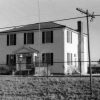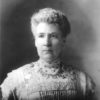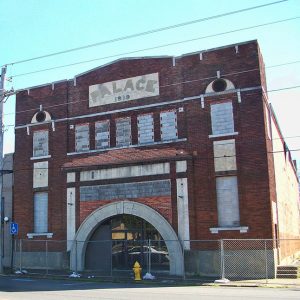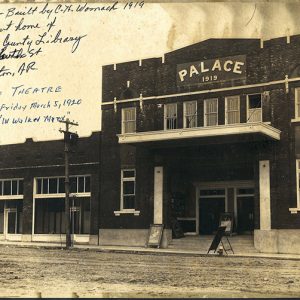calsfoundation@cals.org
Palace Theatre
The Palace Theatre is the oldest building of its kind in Saline County and one of three original movie theaters in Benton (Saline County). It was erected in 1919 at 224 West South Street for a reported cost of $60,000. Originally, the Palace was owned by C. H. (Charley) Womack and was hailed as “The Show Place of the South” by the Benton Courier in 1920. It was listed on the Arkansas Register of Historic Places in 2014.
After World War I, three silent movie theaters were built in Benton: Alice Wooten’s Independent Motion Pictures (IMP) Theater, now the Royal Theatre on South Market Street; the Victory Theatre at 104 West South Street, now a barbershop; and finally the Palace. Womack’s Palace Theatre opened on Friday, March 5, 1920, with the silent film In Walked Mary. The two-story, 110′ x 150′ brick theater had a large marquee that extended over the sidewalk and the brightly lit entrance. The Palace reportedly had 1,000 luxurious seats (more than the Royal), an intricately decorated stage, and a glass-enclosed box office.
The IMP and the Palace were bitter rivals in the early 1920s. Just a few months after the Palace Theatre opened, a fire broke out at the IMP Theatre in May 1920. On May 13, 1920, the Benton Courier reported that Fire Chief Louis Wolchansky’s men found that the IMP had been set on fire intentionally. Womack was rumored to have been involved in the arson. The fire had caused at least $3,000 in damages to the IMP, and on June 10, 1920, the Benton Courier reported that Womack had sold the Palace to the Hefley-Skinner Amusement Company of Oklahoma City, Oklahoma.
By the winter of 1920, the Palace’s new owners fell on hard times and leased the building to IMP owner Alice Wooten. Wooten intended to show movies at the IMP when the Palace was hosting live theater while showing live theater at the IMP when the Palace was playing films. However, in 1921, both were temporarily closed due to financial troubles. The Palace never managed to recover and eventually shut its doors before being purchased by the City of Benton in 1929. The neighboring office building was then used as City Hall. By July 1930, the Sanborn Fire Insurance map of Benton listed the Palace Theatre building as the city’s “Municipal Auditorium.”
The Palace Theatre was abandoned in the years of the Great Depression. Near the end of World War II in 1944, the Palace was reopened as a recreational center for Benton’s youth and renamed the Play Palace. It had ping-pong tables, pool tables, books, a jukebox, and a snack bar. The Palace’s opera-style seating was replaced by a large basketball, volleyball, and shuffleboard court. The old stage was replaced by a dance floor.
In 1953, the Play Palace was closed due to lack of interest, and in 1960 the building was renamed and reopened as a youth recreation center. The Panther Den, named after Benton High School’s mascot, became a more successful hangout spot for Benton’s teenagers. In 1964, the City of Benton remodeled the Palace’s entrance by adding an archway and filling in all windows with brick. A corrugated metal façade was added to mask the front of the building. That façade lasted over forty years. In 1967, the Panther Den was closed when the Saline County Library purchased the building. The Palace Theatre building housed the Saline County Library until 2003, when the library was moved from the building into recently completed new facilities. A millage increase had been approved on August 24, 1998, to build two new library facilities in Saline County.
In 2005, Benton mayor Rick Holland had the Palace’s front façade removed. After that, the building was used by the Royal Players to store props and costumes and by the city government for county food drives; around Christmas, the Palace is used to store toys for needy children in Saline County. In 2012, the Historic Preservation Alliance of Arkansas listed the Palace Theatre as one of the state’s “Most Endangered Buildings” due to its years of neglect, resulting in—among other problems—water damage from a leaking roof. On August 6, 2014, the Palace was listed on the Arkansas Register of Historic Places due to its significance to the people of Saline County. (Because of its various renovations, the building was ineligible for entry on the National Register of Historic Places.)
In August 2015, Mayor David Mattingly and the Benton City Council met to discuss the future of the Palace Theatre, among other issues. Mayor Mattingly and the City Council had been considering demolishing the Palace, but a resolution allowed six months for “review of the overall stability of the structure” before a decision was made about its fate.
In response, a local group of citizens formed a nonprofit called Friends of the Palace Theatre, Inc., in 2015. On November 20, 2015, the Benton Courier wrote that the group planned to save and repurpose the Palace Theatre building as a center for history and the arts, including exhibits on Native American artifacts, the aluminum industry, Niloak pottery, and other facets of Saline County’s history. In May 2019, the city council approved the sale of the Palace Theatre to Shawn Hipskind, a local developer. By August 2020, the site was home to two restaurants.
For additional information:
Friends of the Palace Theatre, Inc. http://www.savethepalace.org/tablet/index.html (accessed September 4, 2020).
“Palace Theatre.” Arkansas Register of Historic Places nomination form. On file at Arkansas Historic Preservation Program, Little Rock, Arkansas. Online at http://www.arkansaspreservation.com/arkansas-register-listings/palace-theatre (accessed September 4, 2020).
Cody Lynn Berry
University of Arkansas at Little Rock
 Architectural Styles
Architectural Styles Early Twentieth Century, 1901 through 1940
Early Twentieth Century, 1901 through 1940 Historic Preservation
Historic Preservation Palace Theatre
Palace Theatre  Palace Theatre
Palace Theatre 




Comments
No comments on this entry yet.